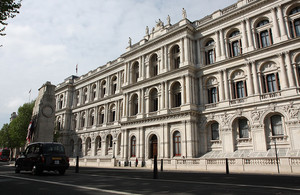The urgent need to avoid further escalation in the West Bank
Thank you Mr President,
As we have heard from UN Special Coordinator Wennesland, we are seeing an increasingly worrying deterioration of the security situation in the West Bank. It is crucial that all parties take urgent steps to reduce tensions, condemn incitement and avoid further escalation in violence.
The cycle of violence continues to take many lives. We are alarmed by the number of Palestinians killed in the West Bank, including East Jerusalem, by Israeli Security Forces, including six minors this month. Investigations should be transparent and comprehensive. Where there has been excessive use of force, those responsible must be held to account.
We are also concerned by the increase in Palestinian violence, where two IDF soldiers sadly lost their lives this month after being shot by Palestinians. We repeat our call on all parties to take immediate steps to reduce tensions. We also stress the importance of ensuring access for humanitarian and development organisations, including in Palestinian refugee camps, even during periods of instability.
More action also needs to be taken to tackle settler violence, which has affected IDF soldiers, but affects Palestinians on a daily basis across the West Bank, especially during the olive harvest. The Israeli government needs to end the culture of impunity and bring those responsible to justice.
Mr President, as we celebrated the tenth anniversary of the International Day of the Girl this month, we should all be reminded of the vital role that UNRWA plays in the region, including in providing education and health services to women and girls. But while girls in the OPTs outperform boys at school and represent around 60% of Palestinian graduates, the fact that employment rates remain low, with only 13% of women over 25 employed, needs urgent and meaningful attention.
The UK remains a firm supporter of UNRWA and values its importance as a vital humanitarian and stabilising force. We encourage efforts to improve UNRWA’s serious financial situation, which threatens its ability to deliver vital services later this year if action is not taken.
Mr President, the need for the parties to engage in meaningful dialogue and collaborate to address the escalating situation in the West Bank is urgent. We are working closely with the parties to that end and we welcome the efforts of the UN Special Coordinator to support de-escalation and encourage further work to reverse negative trends on the ground.
Thank you.
